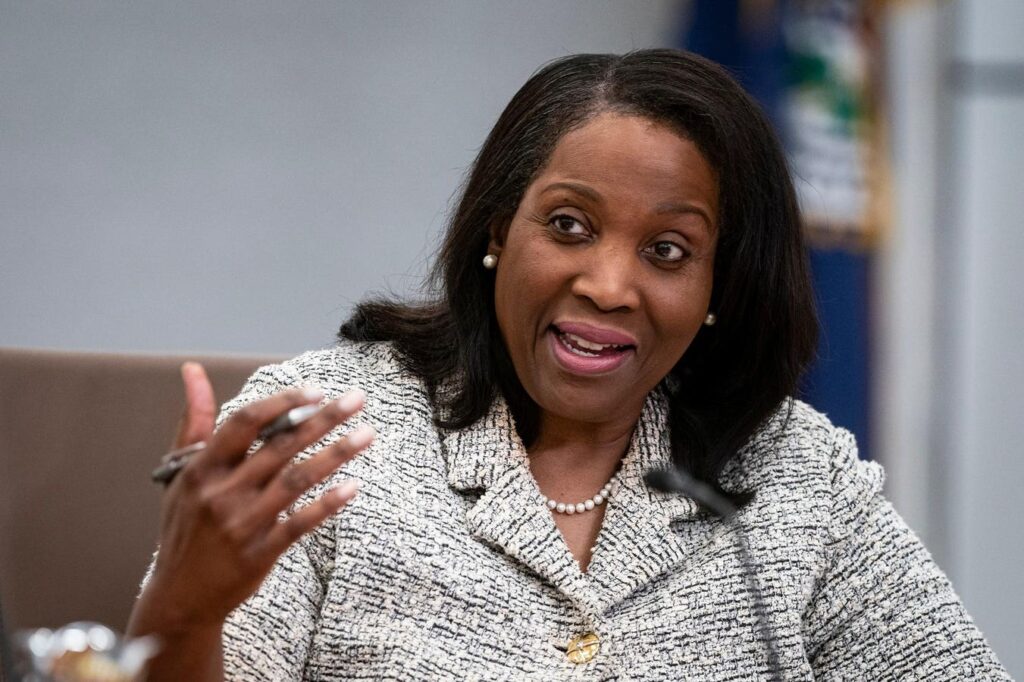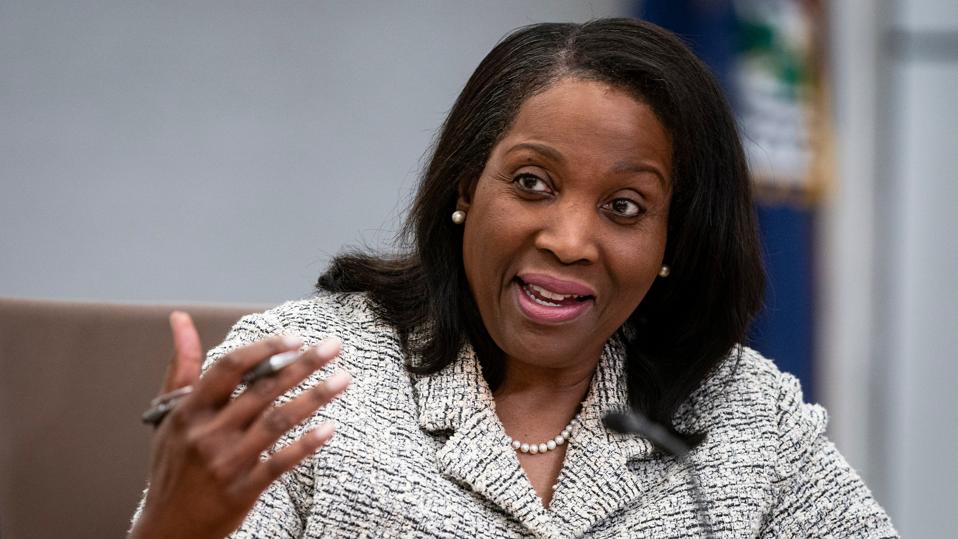Lisa Cook, governor of the US Federal Reserve. Photographer: Al Drago/Bloomberg
© 2024 Bloomberg Finance LP
President Donald Trump announced late Monday that he was firing Federal Reserve Governor Lisa Cook, a Senate-confirmed appointee. This unprecedented action, citing unproven allegations of mortgage fraud, represents a direct undermining of the Federal Reserve’s long-cherished independence—a principle essential for managing the U.S. economy without political interference.
Now, investors are left grappling with the implications of this escalation, which could erode trust in America’s financial bedrock and exacerbate economic stagnation amid soaring deficits and national debt. This firing isn’t just about one governor; it’s a stark warning to the entire Fed board, including Chairman Jerome Powell, whom Trump has repeatedly threatened in recent months.
By crossing this line, Trump risks politicizing monetary policy at a time when the economy demands impartial decision-making.
The Fed’s Independence
The Fed, established in 1913, plays a pivotal role in steering the U.S. economy through tools like interest rate adjustments to combat inflation and foster growth. Its independence from political pressures is not merely a tradition but a legal safeguard enshrined in the Federal Reserve Act, which allows the president to remove governors only “for cause”—a term that has never been tested in this context until now.
This autonomy is the foundation of global trust in U.S. financial markets. Bond buyers and investors rely on the Fed’s ability to act without fear of reprisal, ensuring stable operations even during fiscal challenges like the current massive budget deficits. Historically, presidents from Lyndon B. Johnson to Richard Nixon have jawboned the Fed for favorable policies, often ahead of elections, but none have ever dismissed a sitting governor. Trump’s action shatters this precedent, inviting chaos.
Lisa Cook’s Firing
Trump’s decision to remove Cook, the first Black woman to serve as a Fed governor, was announced in a letter posted on Truth Social. He invoked a “criminal referral” from Federal Housing Finance Agency Director William Pulte, alleging Cook made false statements on mortgage applications in 2021—claims that have not resulted in any charges.
Cook, appointed by President Joe Biden in 2022 and reappointed in 2023 for a term through 2038, has been a steady voice on the board, voting to maintain interest rates amid Trump’s demands for cuts. This move is as grave as if Trump had fired Powell himself, whom he has berated with epithets like “enemy” and threatened repeatedly without follow-through.
Many from the Beltway to Wall Street view Cook’s dismissal as an intimidation tactic: a message to the board that dissent on rate policy could lead to baseless investigations or ousters. The pretext appears flimsy, with Cook’s attorney, Abbe Lowell, labeling the firing as illegal and devoid of basis, while the Congressional Black Caucus decried it as a ploy to replace her with a loyalist.
Economic Risks
Perceived political meddling could steepen the yield curve, pushing long-term rates higher and nullifying any short-term rate cuts the Fed might enact—whether voluntarily or under duress. In an economy already showing signs of stagnation, higher borrowing costs could stifle growth, deter investment, and amplify the burdens of a ballooning national debt.
If investors lose faith in the Fed’s impartiality, we could see capital flight to safer havens, weakening the dollar further and inflating commodity prices. Prudent investors should consider diversifying into global government bonds and risk assets, as U.S. markets face heightened volatility from this political firestorm.
Political Implications
Cook’s ouster could tip the balance of power on the Fed’s seven-member board of governors. If her seat is vacated, combined with Trump’s recent nominee, Stephen Miran—a former Treasury official—Trump appointees might secure a 4-3 majority.
This could force aggressive interest rate cuts, overriding the current consensus and aligning policy with Trump’s agenda. Legal challenges are imminent: Cook vows to sue, as reported by USA Today, arguing Trump lacks authority without legitimate “cause,” potentially escalating the matter to the Supreme Court.
Sen. Elizabeth Warren, Democrat from Massachusetts, has condemned Trump’s move as an “authoritarian power grab,” per Warren’s X post. Yet even if courts side with Cook, the damage is done—the intimidation chills independent decision-making.
Playing With Fire
The U.S. thrives on robust debt markets, but undermining Fed trust is like playing with matches near a powder keg. With deficits at historic highs, any hint of political influence could spike long-term yields, derailing recovery efforts. This isn’t just economic theory; it’s a real threat to global financial stability, as former Fed economist Claudia Sahm noted in an X post, viewing it as a bid for greater executive control.
Policymakers, investors, and the public must remain vigilant. Safeguarding the Fed’s independence isn’t optional—it’s imperative for sustaining America’s economic leadership.
Trump’s firing of LCook marks a perilous escalation in his campaign against the Federal Reserve, prioritizing political expediency over institutional integrity. As legal battles loom and markets react, the risks of continued interference could destabilize the economy.
Investors: Brace for turbulence and diversify globally. The flames of this controversy are just beginning to spread—extinguishing them now is crucial before they consume the trust that underpins our financial system.



